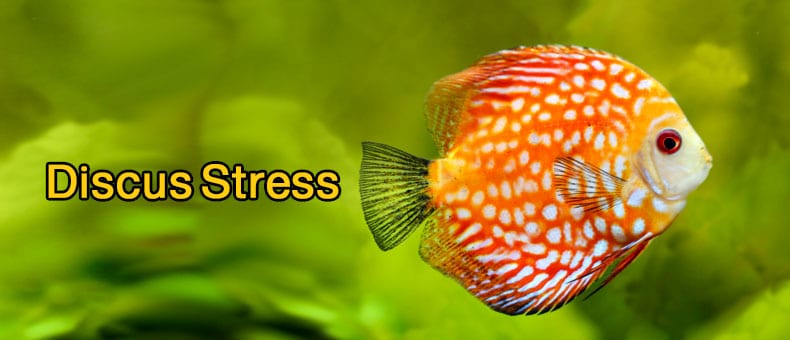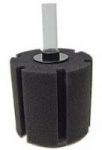
There are a lot of reasons why Discus can be stressed, ranging from poor water conditions, an introduction of a new breed into the tank, which might be perceived as dangerous, and more. The discharge of adrenaline as well as cortisol, which are responsible for the “fight or flight” response in Discus, is usually stimulated by conditions of stress which could be brought on by occurrences or situations in the environment of the fish.
Table of Contents
- What Is A Discus Stress?
- How Do You Know If Discus Is Stressed?
- Can A Stressed Fish Recover?
- Discus Stress Symptoms
- Discus Stress Details And Cause
- Discus Stress Treatment Steps
- Related Questions
- Discus Stress Future Prevention Tips
- Conclusion
What Is A Discus Stress?
Discus stress is a condition in Discus that causes the fish to exhibit symptoms such as frenzied swimming, gasping for air on the surface of the water, and loss of appetite.
How Do You Know If Discus Is Stressed?
There are signs that indicate that Discus is under stress like loss of appetite, hiding, gasping for air on the water surface, frantic swimming, changing in Discus colors, and more.
Can A Stressed Fish Recover?
A stressed fish can recover as long as the object of stress is removed, and that depends on the object since a lot of factors can be responsible for the stress. If the condition of the water is poor, you have to change the water; if the Discus is diseased, you have to treat the illness; if the tank is overcrowded, you have to reduce the number of fishes in the tank and so on.
Discus Stress Symptoms
- Discus begins to linger at the surface of the water in the tank whilst trying to gasp for air because it is not able to breathe properly as a result of the lack of adequate oxygen
- Discus refuses to eat, or it does not eat as much food as it was before (loss of appetite).
- Discus is constantly trying to place itself somewhere; it cannot be seen for a long period (that is, it is hiding).
- Discus is rapidly running or swimming in the tank.
- Discus begins to swim in a frenzied state and then dossing down at the lower end of the tank.
- The fin of the Discus has been cut slightly or what we call it fin rot.
- Discus has wounds that are open and are not healing quickly.
- Discus has a disease that could be caused by fungi or bacteria. The fact that Discus may have a disease is another problem in its own right; however, it also means that the immune system of the fish is not in its best condition.
- White spots on the body of the Discus which could be as a result of scratching against a rock or gravel in the tank in an attempt to relieve itself of an Ich disease.
- Red spots or blotches on the fins of the Discus.
- Black spots on the fins.
- Visible sores on the body of the Discus.
- Discus color changes often to a darker color.
Discus Stress Details And Cause
List Of All Possible Discus Stress Causes
- The concentration of oxygen could be low because the circulation of water is poor.
- High ammonia and nitrite levels.
- Molestation from other fishes that are more aggressive.
- Chemicals that could be toxic.
- Overcrowding of the tank.
- High or low water pH level.
- Low or extremely high water temperature.
- The level of salt in the water is too much.
- Perturbations can lead Discus fish to stress.
- Sudden light changes.
- Improper Discus diet.
- Discus might have a disease or ailment.
- Open wounds or cuts that are not healing.
The concentration of oxygen could be low because the circulation of water is poor.
A low amount of dissolved oxygen in the water can bring about stress to your Discus.
Low oxygen in the water could be because the water condition is bad, probably because you don’t change the water the tank as often as possible. The benefits of changing the water are that the contaminated water with the leftover feed that wasn’t eaten by the fish and waste products excreted by the fish gets replaced. Thus, leaving the environment healthy for habitation.
High ammonia and nitrite levels.
Furthermore, ammonia and nitrate build-up can also come from waste materials and food that have been decomposed, and they can be dangerous to your Discus.
Things can even get more complicated in the sense that there are more excreta since there are more fishes, more ammonia, and nitrite build-up, which will ultimately affect the integrity of the water. All these will be stressful for your Discus.
Molestation from other fishes that are more aggressive.
Also, if you put in too much fish into one tank, the tank becomes overcrowded, and that can also stress your fish as all the fishes, including your Discus, begin to fight for dominance or food.
Chemicals that could be toxic.
Another thing that can pile on stress on your Discus is the introduction of chemicals or and medication into the tank.
If you have more than one fish in your tank that is sick and you want to treat it; you should have that fish quarantined first (placed in a separate isolation tank) before you begin to apply treatment because if you put chemicals or medication in the tank with the other fishes, you will be treating the sick fish but also the chemicals could be affecting the other healthy fishes.
Overcrowding of the tank.
Not all kinds of fish can cohabitate, which means that there are some fishes that your Discus will not like to live with, and introducing those kinds of fishes into the tank can heap on a lot of stress on your Discus.
High or low water pH level.
One thing that could be causing stress for your fish is pH level.
Low or extremely high water temperature.
More so, when the temperature of the water in the tank is not right, it could lead to stress for the fish.
The level of salt in the water is too much.
Stress can also be caused when the level of salt in the water is too much, and this is due to medication with salt.
Perturbations can lead Discus fish to stress.
Also, little perturbations such as loud noises and banging on the tank can lead to stress.
Sudden light changes.
And this happens with me often, my tank is in a room where I have big computer screens, and when those screens are turned off suddenly for screensaver my discus immediately scared and swim quickly to the other side of the tank, avoid having such conditions.
Improper Discus diet.
Refusal to adhere to the proper diet of your Discus can bring on stress. An improper diet is bad for any living organism, and the same goes for the Discus, so make sure to find out the proper diet from the vet.
Discus might have a disease or ailment.
Discus might have an ailment. Just like any other living organism, the Discus will be stressed if it has a disease and some of the diseases that are common to fishes, especially the Discus such as bloat, fin rot, and swim bladder or even an itch can put the Discus under a lot of stress.
Open wounds or cuts that are not healing.
The same thing can be said for when the Discus has an injury or wound that isn’t healing.
Discus Stress Treatment Steps
[STEP1] – Change The Water In The Tank As Often As Possible
If the condition of the water is poor due to ammonia or nitrite build up from waste materials or excreta or leftover feed, it will be best to have the water replaced.
[STEP2] – Increase The Oxygen In The water

Use airstone to add more air bubbles cycled filter into the water, you should keep this bubbling 24×7 especially when using medications for different diseases.
[STEP3] – Check Your Water Parameter
You have to check your water parameters when you see your discus is hiding or showing stress symptoms, you should have a water test kit for testing your water parameters.
[STEP4] – Check Your Water Temperature
One of the main keys to your Discus becomes stress if your aquarium has the wrong water temperature, the perfect water temperature for Discus fish is (82º – 86º F) around (28º to 31º C).
[STEP5] – Overcrowding Of The Tank Should Be Avoided
Reduce the amount of fish in one tank; this will lead to less competitiveness for food and less fighting among the fishes.
[STEP6] – Observe Your Discus As Closely As Possible
This is to make sure that it does not have any kind of illness or disease. Look out for signs of ailments like sores, fin rot, bloat, or swim bladder symptoms.
[STEP7] – Avoid Disturbing The Tank
Loud noises and banging on the tank should be avoided at any length because if the Discus does not feel safe in its own habitat, it will bring about stress.
[STEP8] – Check-in With Your Vet Regularly
To get a professional opinion on the condition of the health of your Discus, they should be able to see something you might have overlooked or not have noticed.
[STEP9] – Use A Stress Coat or Stress Guard
This can help get rid of chlorine, nullify chloramines and make heavy metals nontoxic, thus setting the condition of the water at the optimum.



A stress coat is also effective in healing wounds on the body of the fish as well as torn fins. An API Stress Coat Aquarium Water Conditioner eliminates toxins and reduces stress by 40 percent. API Stress Zyme Aquarium Water Conditioner is another good conditioner that can reduce stress. Also, another option to consider is Seachem Stressguard.
Related Questions
How Do You Treat Discus Disease?
Diseases in Discus can be treated by using a medication, but first, the nature of the disease has to be identified, and to do that, you must consult your vet to assess the fish and see what is wrong with it. The vet can then proceed to tell you what you need to do to treat the illness.
How Do You Calm A Stressed Discus Fish?
- When the condition of the water in the tank where you keep your Discus is not properly maintained, it could end up causing the fish a great deal of stress. So whenever you notice that your Discus seems to be having trouble breathing and is at the surface of the water in the tank, you should conduct a test on your water to see if the condition of the water is not causing the fish any kind of stress.
- Do a regular check-up of the filtration system in the tank to make sure that it is functioning properly. An example is the Fluval Underwater Filter, which can seize debris as well as bacteria and still ensure proper flow of oxygen.

- Remove aggressive breeds in the tank so your Discus can feel safe.
- Avoid overcrowding.
- Provide additional oxygen in the tank.
Discus Stress Future Prevention Tips
- Change the water in the tank as often as possible to keep the level of nitrates and ammonia low.
- Constantly check to make sure that the temperature of the water is uniform and does not ebb.
- Check water temperature for consistency regularly to prevent stressful fluctuations.
- Make sure that the new fish you want to add to the tank is compatible with your Discus. That way, you reduce the incidence of fighting and nipping. Also, when introducing a new fish into the tank, do it properly so that the current fish (Discus) will adjust to having a new tank mate.
- If you notice any behavior that arouses provocation, quickly remove the aggressive fish from the tank.
- Ensure to provide the right amount of feed to your Discus and other fishes in the tank.
- Make room for hiding places. You could introduce Marina Mangrove Root Aquarium Décor into the tank.
Conclusion
Several reasons can lead to stress for your Discus; it may not be getting along with other fishes in the tank, it may be sick, or the water condition is poor. It is your job to identify the cause of the stress and take appropriate steps to remove the object of the stress so that the fish can properly live in its environment without any issues.

Hello I am concerned about my discus. They got startled on Sunday my family was over looking at them and the lifted the lid and did not let it down softly. The noise scared them. Since then two of them especially are showing signs of stress. Fins are blackish and they are hiding. I have checked my water condition and it is fine and have done my daily water change. I have only had them since Thursday October 7th.